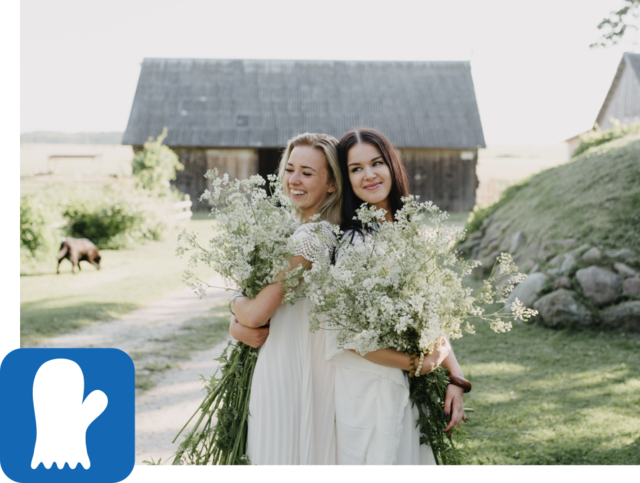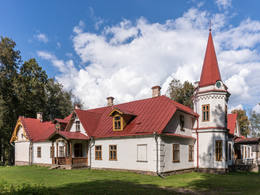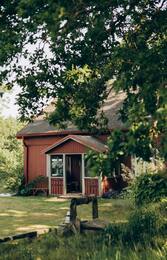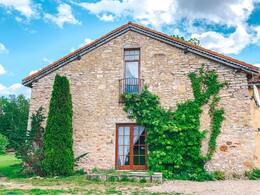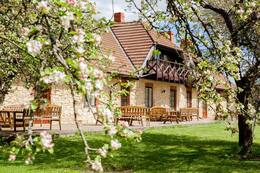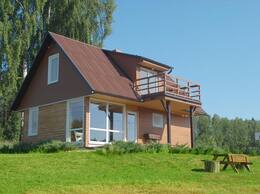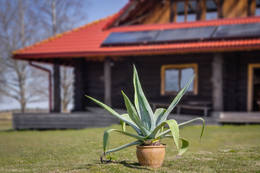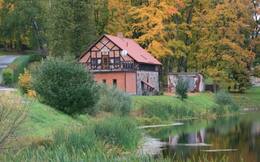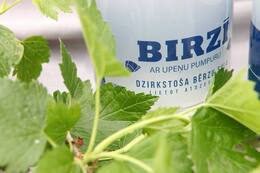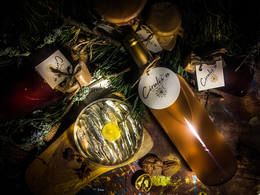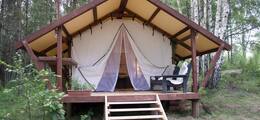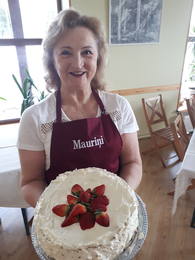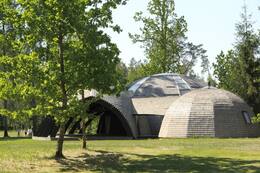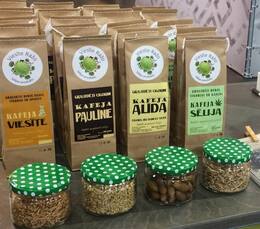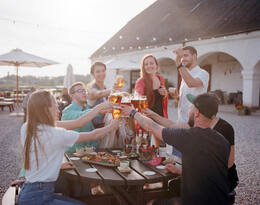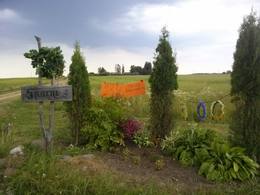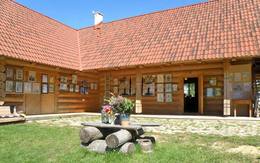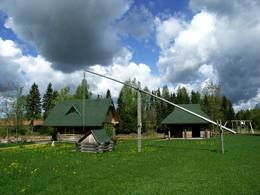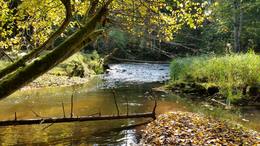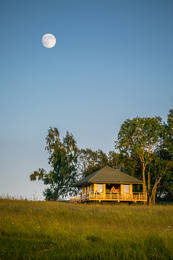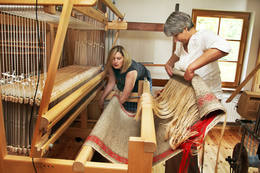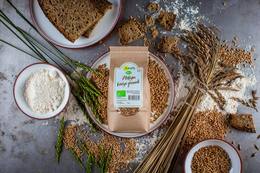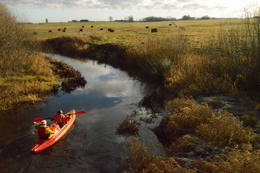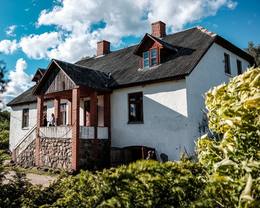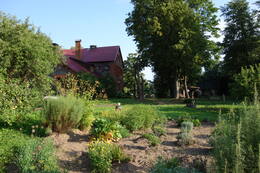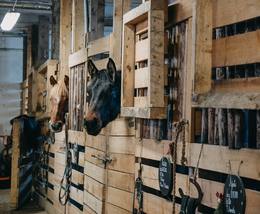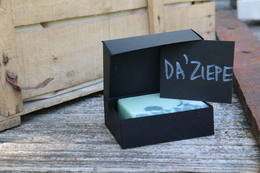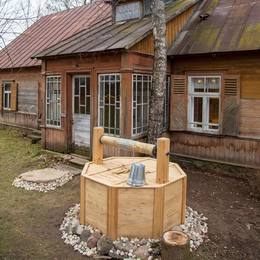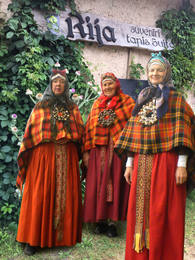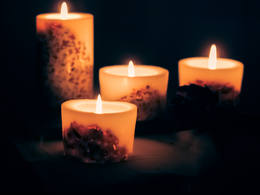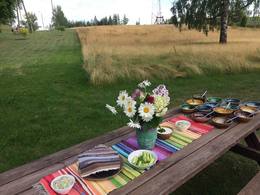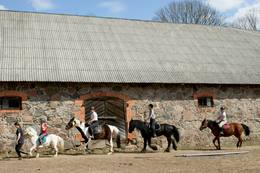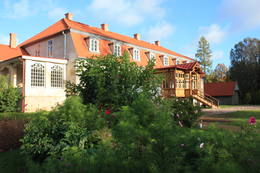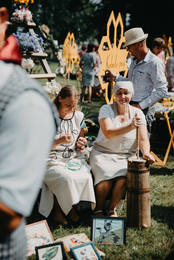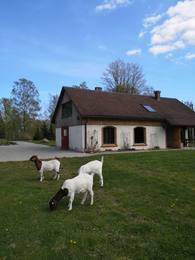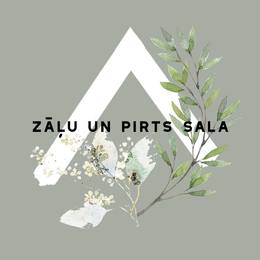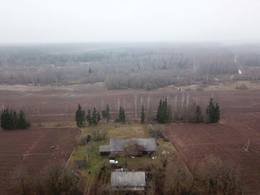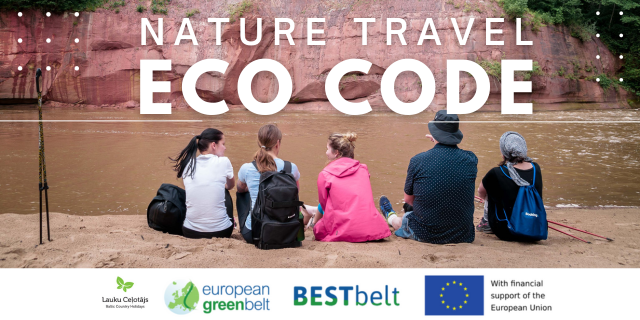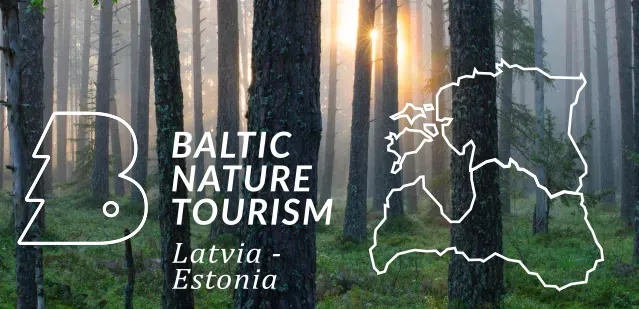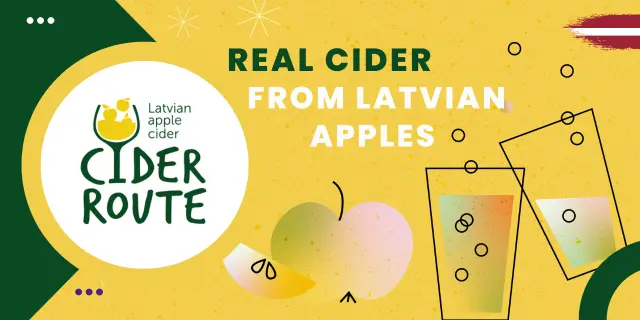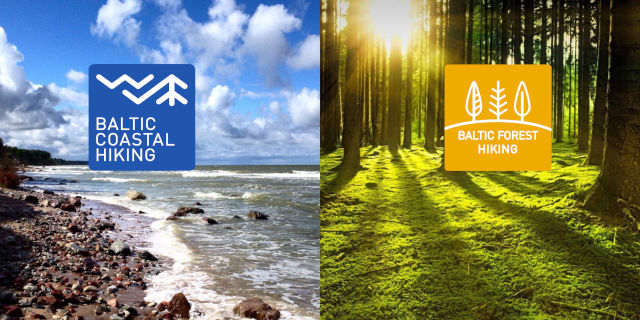
Rural Lifestyle
The "Rural Lifestyle" offer allows tourists to learn about rural lives and people, finding new tourism destinations which have their own identity. This is a story about lifestyles which changes accustomed ideas about the countrywide and establishes a new rural environment in which traditional and modern values can be merged. Guests can learn about life in small towns, farms and companies together with local residents. You can watch and become involved in everyday processes such as gardening, modern design craftsmanship, healthy food, the manufacturing of innovative products, architecture and the environment, a green lifestyle and many other true values.
>>> Rural Lifestyle project web page:
gorural.countryholidays.info
>>> MAP - “Rural Lifestyle” farms
>>> "Rural Lifestyle" events
Here is a list of farms which offer "Rural Lifestyle" experiences to visitors (In Latvia and Estonia). The programme description includes information about the destination and the location of the farm. There will be information about the family at the farm and its history, with the programme also being described via activities. You absolutely must contact the farm in advance, because not all of them offer tourist services, instead working with manufacturing or other activities. Such farms usually set special times and/or days when they are prepared to receive visitors. The duration of the program and the number of people also need to be agreed in advance with the hosts.
| Overview | Details |
|---|---|
|
Latvia
Arendole manorThe Arendole Estate is on the banks of the Dubna River. Its park is a century old, and it has been preserved thanks to a protected plant -- the white viscum. The owners of the farm have spent 20 years and more in restoring the estate and its surroundings. The estate has sheep, chickens, turkeys, a goose, ducks and fish in the pond. The garden produces herbs and vegetables for the kitchen. Accommodations are available in historically designed rooms, with meals, tours and a smoke or black sauna. Owner Arvīds is a lawyer and historian, while his wife, Faimja, is a homemaker and a Tatar from Siberia. She is also an engineer and technologist. The owners will welcome guests to the estate and provide all of the services, including meals and tales about the estate and the history of Latgale. THE PROGRAMME:
|
|
|
Latvia
from 66 - 200 EUR / DBL
The Birini CastleProgram:
|
|
|
Latvia
LUKIApskatei pieejams salons ar seniem un mūsdienīgiem amatnieku darinājumiem, melnā pirts. Vēsturiska informācijas telpa par tuvāko un tālāko apkārtni. |
|
|
Latvia
Divas upesThis family boutique hotel was opened in the 18th century granary of the former Bilstiņi Estate. It is located at the place where the Pērse River flows into the Daugava River. Leisure is offered on a terrace under grape leaves, at the restaurant with a fireplace and grilled dishes, a chance to fish in the river, or a visit to the miniature spa. After more than 30 years of living and working in Rīga, Tomass and Dace and their son Reinis decided to move to Koknese, where Tomass was born and raised. Dace was a violinist at the Latvian National Opera, while Tomass spent more than 20 years working in the automobile business. Now they both have their Mediterranean-style boutique hotel. Guests can have a look at the everyday lives of the couple, accept the slow flow of life with a seemingly simplified look at things, and a chance to become involved on the work of the hotel and the farm. Guests see nearly everything that happens at the house -- the child plays the piano, the husband is screwing together a motorcycle, the wife is practicing the violin, and granny is bringing freshy baked apple pastry which everyone tastes in a friendly way between the two rivers. There will be wine tastings and smoked meat. Fish will be caught in the river, and everyone will go swimming. In the evening, there will be grilled meat, wine and movies on a large screen on the terrace under grape leaves. A shorter trip offers a daytime programme to learn about the lifestyle of the owners. THE PROGRAMME:
|
|
|
Latvia
Hotel KARLAMUIZAKarlamuiza is a cozy hotel located near Cēsis town in the Amata River valley. The guest house is located nearby a landscape park and a nature trail by the Amata River. Mushrooming is a national passion in Latvia. Trying out a mushrooming experience is part of getting to know the local way of life and doing things the way locals do them. The forest terrain in the selected mushrooming spots is easy to walk, covered with moss, fallen leaves and small plants. Occasionally there are bushes, some fallen trees or wet spots. Gauja National Park, established in 1973, was Latvia’s first national park, and it has great traditions in environmental tourism. The most popular edible mushrooms are the various Boletus and Chanterelles. The selected species for foraging are chanterelles, russulas and various boletus: Chestnut Bolete (Gyroporus castaneus), Lurid Bolete (Boletus luridus), Sheep Polypore edible tree-fungus (popular in Scandinavian cooking) (Albatrellus ovinus), Golden Coral (Ramaria aurea), Coral Tooth (Hericium coralloides), Parasol Mushroom (Macrolepiota procera), Ceramic Parchment (Xylobolus frustulatus) and WoodRotting Fungus (Phellinus nigrolimitatus). N.B. For comfort and safety it is recommended that participants wear outdoor clothing and footwear. PROGRAMME:
|
|
|
Latvia
from 60 EUR / night
Meza SkukiForest Skuķi are the property of the Skuķi family, and that has been true for several generations. The farm in Latgale is in a remote location. It is next to a forest and the private Lake Inikši (Forest Skuķi). Since the 1930s, the farm has had a black smoke sauna, large barns made of logs, a granary and a cattle shed. Some fragments of a full cycle of natural farming have been preserved -- a fruit and berry orchard, a greenhouse, a little garden and chickens in the cattle shed An apiary has flourished and been expanded. The farm welcomes guests who have access to a modern weekend house that is surrounded by approximately 20 hectares of natural meadows, a forest, lake and pond. The lady of the farm, Aija, is a professional sauna master, a passionate gatherer of mushrooms and berries, and a manager of the apiary. A visit to the farm will take all day to learn about the country lifestyle. The programme must be arranged in advance, and that will depend on the season of the year and the interests of the guests. Visitors can go fishing, spend an evening at the sauna with the lady of the house, gather ingredients for herbal tea and dry them, go to the apiary, get honey and go mushroom or berry picking. Visitors can purchase beekeeping products, local herbal teas and plants from the Forest Skuķi garden. Several days can be spent at the farm, spending nights at the weekend house. THE PROGRAMME:
|
|
|
Latvia
Sabiles Sidrs CideryThe "Sabile Cider" company is nearly in the heart of Sabile. Each autumn, farmers in Kurzeme provide apples that they have grown in their orchards so that the plant can squeeze the juice and then ferment it to cider. The plant is a public meeting place. During the summer, it and the Sabile local government organise concerts and cultural events there. Baiba and Aldis Circenis from Rīga began their story in Sabile more than 20 years ago, when they purchased a nearby "oasis of calm" between linden and oak trees. They celebrate Latvian holidays, offer lessons about farm work, and after thinking about what to do with their enormous harvest of apples, produced the first Sabile cider after many experiments. The idea of this involves the neat garden with old and tall apple trees. The couple also studied the enjoyment and manufacturing traditions of cider in the ancient superpowers of cider, England and France. Visitors can take a tour of the factory and learn about how cider is produced there. The lady of the house will talk about how she changed her career and became a cider master. Visitors can taste the cider and purchase some to take along at the Sabile Cider House, which is right next to the plant. PROGRAMME:
|
|
|
Latvia
Agave“Agave” is located in the countryside and there are forests and Ligatne river nearby. The place is perfect for listening to birds’ songs and watching wild animals in the early mornings or late evenings. In the guest house “Agave” there is a garden surrounded by spruce trees, special for Latvians - the Garden of the Balti Signs, where you can find and feel your magic sign and take your time for meditation. The signs are based on ancient Latvian writings. The ancient Balti signs are able to influence the tangible, intangible and spiritual side of our lives, bringing wealth, happiness, luck, strength, fertility and health. Each character has its own meaning and the effect of the sign can only be related to thought, subconscious and nature. In the guest house there is also sauna for everyone to enjoy. After sauna it is possible to have a swim in the pond or hot tub. Here everyone can stay overnight in authentic horse stable stalls, enjoying the smell of the flowers and grass of the countryside. In Latvia until the end of the 20th century, during the summer months rural residents slept outside the house – in barns and hay sheds. If you prefer comfortable rooms, you will be able to stay in the guest house. The hosts Sarmīte and Jānis Šteini enjoy living in countryside and they have lived in Līgatne for more than 10 years. Sarmīte is very interested in folklore and is an expert in ancient signs and the meanings of them. Jānis loves to take care of the environment and buildings. They both understand the importance of fresh air and country living. During holidays they take care of their grandchildren. Sarmīte is an expert of soup making on fire. She uses products from local farms and her own garden (onions, potatoes, beetroot, meat, herbs etc). PROGRAMME: Day 1
Day 2 Breakfast
|
|
|
Latvia
The family company Poļu nams was established more than 20 years ago, and it produces sweets that were popular during the Soviet era -- the Sweet Brunette chocolate sausage, as well as cookies filled with condensed milk that are known as Sweet Pearl or little nuts. The owners started the work at their flat in Rīga, but now the manufacturing facilities are in a building which used to be a culture centre. The products are still made by hand. Gunita has run the company from its origins and greets guests who wish to tour the manufacturing plant. That will be of interest both to adults and to children. Gunita designed her own house and initiates reanimation with the idea of dealing with the big building. Step by step she is putting together a club, Lāde (Chest), to focus on esoteric issues, education and leisure. Gatis supports Gunita in her efforts by handling all of the reconstruction and construction work. During tours, guests will visit the manufacturing facility, learning about the building and its history. They will be able to taste the sweets and then have lunch with the owners. A master class in preparing sweets can be arranged in advance and depending on the workload of the company. People can learn how to prepare the Sweet Brunette or the little nuts. THE PROGRAMME:
|
|
|
Latvia
Apinu kalteWe offer ancient dishes of Madona region (group catering), culinary master classes (ancient dishes, etc.), use home-grown berries (strawberries, raspberries), etc. agricultural products because they own a farm. The guest house is located in an old building, which is easily located. Participation in programs such as "Meet your master", "Real Latvian hosts 2017", etc. |
|
|
Latvia
Sparkling birch sap production plant BIRZIThe "Kainaži" homestead is nearly 150 years old, and it is between Smiltene and Rauna. The farm is encircled by hundred-year-old oak trees, and it is in a quiet place far from major roads. The farm has a park of more than 300 different types of maples, birches and walnut trees. For many years, the Labanovskis family has been producing and popularising various types of birch and maple juice. The owners studied Canadian experience in the production of syrups, and they have done so successfully for several years. Products at "Birzī" are biologically certified. Līvija and Ervīns traded life in Rīga for life in the countryside to pursue their ideas about creating a business that sells juices. Ervīns inherited the knowledge of his parents about the circulation of sap in trees and the valuable properties of the resulting juices. He also studied Canadian technologies in the processing of juices. Sister Nora works in Rīga, but during her free time she also is excited about visiting "Birzī." The owners offer visitors a chance to tour the processing line and the juice park. They can plant a tree and taste birch juice and its various variants, from fresh to sparkling juice with various tastes. There is also birch juice syrup. In June, when the leaves of birch trees are fresh and full of energy, guests are encouraged to help in producing birch switches. Feel the powerful aroma of birch leaves and then bring your switch home with you. A special offer is lunch for groups of visitors outdoors. PROGRAMME:
|
|
|
Latvia
Cirulisu Majas LabumiThe village of Kaltene stretches more than seven kilometres along the western shore of the Bay of Rīga. The Rožkalni family are local residents who built the Cīrulīši farm on land that they inherited from their grandfather. Eventually they opened a winery. Wine tasters began to visit, which meant that there was also a need for delicious food. Owner Gunta is a food technologist who specialises in the manufacturing of unsterilized canned fish. She also produces fish products that are popular and known under the brand name of "Home Goodies from Cīrulīši." These products are available at local stores. Cīrulīši offers various fish snacks, homemade wines and cider from berries, fruits and flowers from the farm's gardens. The company also offers conserved foods, jams, sauces, Balsamic vinegar and syrups from ingredients harvested in its own garden. Visitors can taste wine, cider, sangria, mulled wine and fish products. They can help to prepare ancient Kaltene fishermen's food. THE PROGRAMME:
|
|
|
Latvia
Glempings suitu seta "Eglenieki"The opening of the folk tradition season in lively Alsunga! Stay at the centre of the administrative district of the noble suiti people, with glamping available at Eglenieki. Spend the night in a tent that is out in nature and just 15 km from the sea. The location is sufficiently remote to enjoy the presence of the environment. The glamping offers what’s necessary to spend the night so close to nature. A coffee machine, a grill, kitchen appliances and, particularly, a comfortable bed for two … just like at home! Guests at Eglenieki are welcome to visit the owner’s teahouse, Sapņotava, where the ceremonies of Latvian tea drinking can be enjoyed. You’ll learn about the medicinal characteristics of teas and make friends with the local community of friends. Order breakfast and dinner, and you’ll be able to rid yourself from the hurries of your everyday life. |
|
|
Latvia
The “Maurini” guesthouseThe Mauriņi guesthouse is seven kilometres from Sigulda and in the middle of the forest. The farm has a large oak, a pond for swimming, and a park that covers nine hectares. The guesthouse has a warm pool, a sauna, a tub and a sauna barrel outdoors. All around the guesthouse are ancient and typical Latvian flowers, including tiger lilies, phlox, peonies, dahlias, etc. Owners Andris and Māra Zemdega built the guesthouse themselves and have managed it for more than 15 years. Māra bakes yeast breads, including rye wholemeal bread, rye bread with dried meat and onions, scalded rye bread, seed bread and yeast white bread. Visitors will learn how to bake bread and will receive yeast and a recipe to bake bread at home. While waiting for the dough to rise, Māra will offer various activities such as gathering wild herbs for tea, cooking jam and baking pierogi. An alternative programme involves the ability of guests to spend the night at the guesthouse when it takes longer for the dough to rise. Visitors will have access to a sauna and a pool. THE PROGRAMME: A master class in baking bread:
|
|
|
Latvia
"Arpus laika"The name of the house is ‘Ārpus Laika’ and it means ‘Beyond the Time’. The family likes the green rural lifestyle. They have created a landscape park and they practice green living in a dome house designed by themselves. The family also manufactures garden furniture and hammocks. The buildings are surrounded by a beautiful park and a pond full of frogs and fishes. The surrounding landscape of the park with a pergola, a bridge, a forest and fields creates a very tranquil countryside atmosphere that can be experienced just a short drive away from the capital city. "Beyond the Time" is a family business, where the owners have fulfilled their wishes - the owner has built a dome house, made the interior and furniture of the building, as well as works as a chef, feasting guests with delicious food, but the hostess can receive guests and organize concerts with the best Latvian musicians. The hostess will guide the guests through the dome house park introducing the concept and making short stops in between to offer tasting of her home-made wines. The visit ends with a master class of Latvian desserts. Programme:
|
|
|
Latvia
Cafe AlidaThis company has been producing chicory coffee since 2009. The landlady, Jolanta, has used her grandmother Alīda's recipe and processes. The farm produces chicory, and it buys carrots and grain from other farmers. They also pick acorns from the greatest oak trees of Selonia. The coffee recipe has been given a Culinary Heritage mark. Jolanta Kovnacka returned to her native Viesīte Administrative District after finishing her education and gaining work experience. The idea of a chicory coffee factory was a response to a financial crisis. Jolanta is delighted to do work that she enjoys and that is appreciated by her clients. That's why she opened the company's doors to visitors. Guests will learn about the production of the coffee, the raw materials, the history of the process, the farm, the garden and the hothouse. There will be a chance to prepare one's own coffee mixture. After working with the coffee or doing other work at the farm, guests can spend some time at a coffee cup in the garden of the farm. Guests can also go on a short walk in the area and buy products to take home with them. An additional option is to take part in cracking acorns to prepare raw materials for the coffee. THE PROGRAMME:
|
|
|
Latvia
Brewery VALMIERMUIZAS ALUSValmiermuiža is on the northern border of the city of Valmiera. Aristocratic estates were established there during the 15th and 16th centuries, and all of them had breweries and saloons. Valmiermuiža had a Castle Saloon where beer was brewed and sold. Latvians were allowed to brew beer for home consumption, and that kept traditional brewing techniques alive in Latvia. Valmiermuiža continues to brew live and natural beer to continue the old traditions of the estate and to honour the ancient history of beer brewing in Latvia. Visitors can examine a series of brewery tools which supplement the stories, allowing people to compare brewing techniques from the past and the present. The visit would be unimaginable without a fancy and informational tasting of beer. Owner Aigars Ruņģis was born and raised in Valmiera, and he has deep roots in the region. That was one reason why he decided to open up a brewery at Valmiermuiža, which has a powerful and ancient history and a successful spirit of entrepreneurship. Since 2009, the staff at the brewery has expanded substantially. Each day, employees produce beer and other refreshments. They greet every guest who turns up at the Valmiermuiža beer kitchen or retail facility with true sincerity and hospitality. The staff are also happy to talk about beer and to offer tastings. PROGRAMME:
|
|
|
Latvia
SparniThe farmstead "Spārni" is located on the Latvian-Lithuanian border, near the Vadakste river. |
|
|
Latvia
Dzirnupes"Dzirnupes" is a traditional farm in rural Vidzeme at a distance of 15 km from Limbaži. During summers, the owners accept guests, offering a chance to spend the night in a romantic granary. It was built in 1924 as a grain storage facility, but now it is a cosy little place for guests. The granary is designed in an ethnographic style with antique furnishings, interior design objects and tools. The granary also has a sauna. The farm features a pond and little river for fishing or boating, a pergola and a place for picnics outdoor, a volleyball court, a small garden with local country goodies, and blossoming meadows. Visitors will also meet some pets -- a goat, some geese, some chickens and a cat. The "Dzirnupes" farm is managed by the Palelionis family -- Juris and Sandra. Their adult children come to help out when they have free time. Juris is a percussion master whose speciality is drums made of stumps. They are carved from fir, linden and willow trees. The stump is covered with sonorous goat or beaver skin. Juris also makes other musical instruments and souvenirs, including horns, percussion instruments, pipes and whisks. Guests will learn about the farm, dine on country goodies, drink herbal tea, listen to a story about how stump drums are created and, at the end of the process, play music together with their hosts. PROGRAMME:
|
|
|
Latvia
Watermill of the Krape manorThe watermill of the Krape Estate is found on the Lobe River in the Ogre Administrative District. Owners offer tours of the mill so that you can learn how the old mill operates. You can stroll along the banks of the river or learn about plants in the meadow. There are places for tenting, but the main operation here is the production of elixirs from meadow plants, production of soy wax candles, production of etheric oils and hydrolats, a well as growing trout and African catfish that can be viewed during the season. A new thing is SPA services with floating, a halotherapy salt beach and an aromatherapy steam system. Floating is a unique way to boost your health. You’ll be dipped into a warm magnesium salt solution, which will allow your body to relax completely in physical, emotional and intellectual terms. The solution (MgSO4) is very concentrated, and it has a temperature of +37C, which is body temperature. That’s what makes the procedure so relaxing. Your body will not sink because of the concentration of salt, and you will float above it like bobber. You will relax all of your tendons and possibly compressed nerves. Your limbs will “oil up.” Your body will receive a very necessary dose of magnesium through your skin. You can also take part in baking KrapesKrepes crepes – home baked crepes made of milk from one neighbouring homestead and eggs from another neighbouring homestead. You can also prepare a meal on a Himalayan salt board |
|
|
Latvia
The Indani farmThe farmstead is located in the Abava Ancient River valley. Visitors can experience true Latvian farm life here. In the farm there are goats, sheep, horses, geese, chickens, rabbits and other animals. The restoration of the farmstead began in 1991 and at that time there were collapsed barn walls and an overgrown apple orchard. The Ezeriņi family started renovating this farm in order to fulfil their eldest daughter Signe's dream of living in the countryside and owning her own horse. Signe now shares the fulfilment of her dream with the arriving guests, allowing to get to know and live a real country life, participate in pet care and enjoy rural romance, baking pancakes, whipping butter in a rural kitchen, taking sauna and riding a horse. In a 2 hour farm tour visitors will learn about milking cows and producing meat, examine a collection of antique tools and will be treated to home-made delicacies. Also an overnight stay is possible to enjoy more of a country life, take a sauna with birch and juniper switches and swim in the local pond. PROGRAMME:
|
|
|
Latvia
Keramikas darbnica LilaJūs varat līdzdarboties keramikas darbnīcas norisēs vairākos formātos: keramikas kursi (nodarbības pieaugušajiem), pāru nodarbība, meistarklases, ģimenes nodarbība, grupās, radošās darbnīcās (izbraukuma vai uz vietas keramikas studijā).Māls ir pateicīgs materiāls un ikviens, neatkarīgi no prasmēm vai talantiem jau pirmajā reizē varēs izveidot saimniecībā noderīgas lietas (krūze, šķīvis, bļodiņa u.tml.), mūzikas instrumentu (svilpaunieku) vai jaukus un smieklīgus nieciņus (dzīvnieki, cilvēki, sniegavīrs, svečturīti u.c.). |
|
|
Latvia
Jeru KlubsThe “Lamb Club” is a farm in Mazsalaca, and it is special because the sheep live in a real club! The owners offer the atmosphere of a farm at which the sheep play major roles. Enjoy mutton and sheep milk foods and beverages, feel how comfortable it is to read your favourite while sitting on a fluffy sheepskin, and, in order not to get cold by the campfire in the evening, you can purchase warm woollen socks and woven woollen cloaks. The owners hope that people from Latvia and all around the world will spend more time at the farm, because accommodations involve a new glamping tent that is as close as possible to nature and the healthy rural environment. Don’t lose a lick of the comfort that you are used to in your everyday life! The owners, Ilze and Valters, will be happy to give you a tour during which they talk about herding sheep. If you contact them in advance, they will prepare a tasty mutton meal for you. The tour can also be supplemented with various activities such as games, quizzes and creative workshops at which sheep wool is utilised. |
|
|
Latvia
Rujienas amatnieku biedriba "Ruzele"The craftsmen's association unites 65 craftsmen from Rūjiena and its surroundings. Offers baking, jam cooking, cheese tying, jewelry making, leather goods, crochet and culinary master classes. Also offers "Made in Rūjiena" tastings (bread, smoked products, culinary products, jams, fresh juices, pumpkin products, seasonal berries and fruits, other dishes in each season) and shopping. |
|
|
Latvia
Amatniecibas centrs "Rume"The village of Zasa originated at the estate of Baron Zass. The pride of the village is the lovely landscape park of the estate with foreign trees and stands of oak. The little Dzirnupīte River flows through the park with little bridges, islands and places to relax. Rūme is a place where creative craftspeople from Sēlija can gather. An impressive log building with a reddish tiled roof offers people who know a great deal about Sēlija, still speak Selonian, wear Selonian folk costumes and are proud of the prickly and revolutionary nature of Selonians. These craftsmen preserve traditions and honour spiritual heritage. They offer things that are appropriate for modern homes and people. Daina Alužāne originated the crafts centre. She also established the "Sēlija Islands" tourism network for the local community, and she brings together craftspeople from the nearby area. Anda Svarāne is a well-known artist in the field of ceramics and an art teacher. Daughter Ieva also takes part in the process. The two women produce traditional dishware that is based on ancient pottery traditions, as well as modern designs. They mostly work with white clay, and their glazes offer the silvery and grey foggy mornings of Sēlija, as well as the lichen of the local swamps. Aivars is a carpenter and leatherworker who uses ancient tools and modern technologies in his work. Visitors to the craftspeople centre will help to prepare a Selonian meal, hear the living Selonian language, test their abilities at making leather bracelets and ceramicware, and learn about the archaeological costumes of Sēlija. THE PROGRAMME:
|
|
|
Latvia
Holiday home and organic farm INDRANIThe owners of "Indrāni" are farmers and inhabitants of Skujene parish in countless generations. This is evidenced by the oldest church register books. Now the "young", Margēviči family, livea and work here. The current owners of "Indrāni" have been operating in Indrāni since 1988. The landlord's parents exchanged the overgrown patches of land with the ruins of old buildings for a "Līvāni" type house. There came better and worse times, joys and sorrows. But the main thing is and remains - work, land, family. The owners are proud that everything they offer to their customers is made on the farm. From the seeds in the bed to the full baskets in the cellar, from the berries in the bog to the jar. Recipes made in Indrani are not found elsewhere in the world - red clover marmalade, linden candies in chocolate, heather syrup, chamomile kvass and more, and more. "Indrāni" is organic farm. For many people a year is white at both ends and green in the middle, but in Indrāni it is green throughout. And year after year! Liene and Aleksandrs Margeviči, Ilva Margeviča and Jānis Jasulis. The Margeviči family is not entrepreneurs or businessmen, they are simply the owners of their land. Aleksandrs is a forester by profession, but the new generation is a professional chef. All other work is done with a body of knowledge that has been inherited and accumulated from experience over the years. PROGRAMME:
|
|
|
Latvia
Cecilu dabas takaThe Cecīļi nature trail is in the ancient Abava River valley in the Gauja National Park. It is 5 km long and offers a lovely natural landscape with cliffs, caves, waterfalls, rivers and an interesting terrain. The trail is managed by Kristaps Kaņeps, who began work on it some six years ago. He offers hikes that offer a chance to learn about the trail in various creative ways -- looking at it through glass, sensing nature with closed eyes, using a compass, searching for pearls of the Cecīļi nature trail, or creating a new forest story with the use of gypsum. At the end of the hike, a sauna and swim in the forest. Environmental guide Kristīne Sniedze leads some of the hikes. THE PROGRAMME:
|
|
|
Latvia
The LIELKALNI farmHalf a kilometre beyond the Ungurpils village and in the direction of Pāle is the Lielkalni farm, which covers three hectares and has a berry orchard, a garden for the needs of the owners, and a small and old apple orchard. The berry orchard has various kinds of little known, but healthy berry and fruit bushes and trees, including lindens, golden currants, black currants, edible honeysuckle, shadbush, Cornelian cherries, black elderberries and walnuts. The garden also has herbs for tea, including oregano, marigold, coneflower, lovage, peppermint, angelica, mandrake, etc. Guests are welcome to pick their own berries. Aija and Dainis Paukšēns are pensioners, and they inherited the farm. They have planted several thousand berry and herbal plants. Lielkalni have been a certified farm since 2006. Visitors will be given a tour of the garden and learn all about the berries and relevant products which can be purchased. THE PROGRAMME:
|
|
|
Latvia
Elka Hill FarmThe farm is located in one of the most picturesque places in Vidzeme, ELKAS KALNS. The height of Elka hill above sea level is 361.5 m and it is one of the highest in Vidzeme highlands. Latvia's longest river, the GAUJA, begins at the foot of Elka Hill. The farm's 11 ha property consists of biologically valuable meadows, a small forest, a backyard pond with fish. There is a well-kept orchard. Honey from biologically valuable meadows is harvested in a small beehive. Herbal teas are harvested both on farm meadows and in the forest, and grown in the garden, following the principles of organic and permaculture. When visiting the farm, it will be possible to get acquainted with the very wide use of plants and collect your favorite plants. Herbal tea mixtures and powders are made from harvested plants, but this does not end the application. The plants are used to make syrups (such as young spruce needle syrup), infusions (such as St. John's wort in vodka), extracts (such as calendula in oil), fermented (such as raspberry leaves or fir flowers). The farm offers tastings of jams, juices and syrups. Everything is made from home-grown berries and fruits. Maple and birch sap harvested in spring is frozen and can be enjoyed fresh all summer. All products made on the farm can be tasted. During the visit to the farm, with the participation of creative workshops, it is also possible to prepare something useful for cosmetics, such as soap with vegetable powder, cream with vegetable oil extract or distillate from plants, which can be used instead of lotion. An interesting creative workshop using plants for yarn dyeing. The farm has a small weaving workshop. Here you can weave your medicine mat, for example, for sauna rituals. If time allows and you are interested, you can learn the basics of weaving and weave, for example, a small rug from your old T-shirt. The owners (Inese and Valdis Stibe) and their family have been managing Elka Hill for 15 years. The family of several generations are from Riga. Initially, only summers were spent here, but also winters in the last few years. Much effort has been made all these years to maintain the landscape and preserve the natural environment. The hostess has mastered the principles of organic farming at the Latvia University of Agriculture and the basics of permaculture courses. Knowledge is applied on a daily basis in gardening, collecting and processing plants. Growing, collecting and making tea is one of the housewife's heart's desire. The second heart is weaving, dyeing yarn with plants. The owner's passion is an orchard and berry garden. In recent years, the owner's heart is bees. He has also acquired the knowledge of a beekeeper through courses and practical work. PROGRAMME:
|
|
|
Latvia
The “Gulbji” Selonian homesteadThe “Gulbji” Selonian homestead is one of the very few places in Latvia where one can see a farm typical of the historical region of Selonia with its typical buildings. “Gulbji” is comparatively far from major roads and populated areas. The homestead is located in a landscape with forests, natural meadows and hills. There is a lake on the property, a spring and ponds. The farm grows vegetables, fruit, berries, and produces milk products. The hostess takes care of her collection of perennials and decorative garden. The family also keeps bees for honey, produces herb teas, makes sauna products such as scrubs, oils, and sauna whisks. The hosts are the 6th generation of the family living here. Rita is a gardener by profession, Juris is a master in crafts. They returned to the family home over 15 years ago. Rita and Juris believe that the special unique value of the house is in its Selonina spirit that is present in everything here - the household things made by ancestors, the inherited food recipes, traditions and customs passed down through generations. During the visit, the hosts will show guests around the farmstead and explain about the Selonian lifestyle - the traditional yard with its buildings, the garden and farming. After lunch, there is a choice of master classes in traditional Selonian crafts, foods or celebration of traditional festivities. PROGRAMME:
|
|
|
Latvia
Ausanas darbnica "Mailisu Fabrika"The Mailīši factory was established in 2018 to preserve handiwork traditions and skills. The factory weaves textiles from wool, flax and silk, as well as blankets, shoulder wraps and linen towels. Visitors can examine and try all kinds of hand-driven looms that were used in Latvia from the 9th to the 21st century. Guests can start with vertical weaving stands or programmable looms. There are two Viļumsons looms that were invented and patented in Latvia. Ilze is a fourth-generation representative of the family to be involved in weaving. Her mother, Inese Mailīte, has been a weaver for nearly half a century. Visitors will learn about weaving textiles and the various technologies that are involved. A creative workshop will allow guests to sew a small 30x30 cm pillow with textiles from the workshop, filling it with sheep wool. Alternatively, guests can prepare a knot pillow, weave a sample of a belt, prepare an accessory for a costume, create yarn or twine. THE PROGRAMME:
|
|
|
Latvia
Zemnieku saimnieciba KanepitesZ / S "Kaņepītes" is a family company founded in 1992. The farm takes its name from the name of the house given to it in 1924. Organic farm where cereals are grown and processed into food. The production of the products is small, but the technique has an ancient atmosphere, a stone, wooden mill that gives a special taste and aroma to flour and oatmeal. Now the assortment already has 30 different product types. |
|
|
Latvia
Zemnieku saimnieciba "Ozolini"The farm is surrounded by biologically valuable grassland meadows and forest, and has its own forest lake. The nearest neighbours are 2 km away. This is one of the first businesses in Latvia where, after the restoration of independence, tea production began using Latvian wild and garden plants. For more than 20 years now, the brand "Lauku tējas" (country teas) has been available on store shelves. Evita and Martins Lukini has overtaken family business and continue herbal tea production as well as sustainable forestry and create events to reconnect people with nature to awaken their mindfulness. The main business activity is still production of ecological teas continuing the usage of ancestral knowledge, collecting teas and preparing them according to ancient methods, using fermentation - suturing. Guests will get acquainted with plants and tea making by participating in the Mandala tea workshop and creating one’s own tea to take along. Participation in herbal meditation will enable each person to choose the most suitable and necessary herbs for her or him to be used for making the tea.
|
|
|
Latvia
Biedriba "Selijas laivas"The "Sēlija Boats" organisation is located at the "Skārdupītes" homestead, which is some 5 km from Aknīste and on the side of the P73 Vecumnieki-Nereta-Subate road. The area is being developed for active tourism, hoping that visitors will be able to stroll around the nearby forests and wetland meadows, learn all about the history of boating, rent boats and bicycles, stay at well-appointed tent locations, and cook a tasty meal on a campfire after an intensive hike. In 2018, Ričards and Santa Šmits moved from the capital city to Aknīste, where Santa was born and raised. The couple are local patriots and fans of active leisure who want to have an active lifestyle in the countryside and to enthuse others. They use the "Sēlija Boats" organisation to ensure this step by step. The local community has organised events to clean up the environment, to set up an appropriate infrastructure for boating, to organise widely attended educational hikes, and to attract financing to facilitate local patriotism in Sēlija. PROGRAMME:
|
|
|
Latvia
Gästehaus AUSMASGuest house "Ausmas" is located in Valka region, and can accommodate up to 30 people. Catering services are also available both on site and off-site. Guests have access to a wet sauna, as well as a sauna ritual with a skilled bather. The guest house organizes various events, as well as tours and groups of children. There is also an animal farm on the farm, where children can feed and love a variety of animals. The owners actively cooperate with the neighboring farms. The owners of the guest house are home-grown producers who offer guests a variety of smoked meats, cheeses and homemade bread. Master classes are offered in both cheese tying and bread baking. It is possible to visit and organize tastings both with home-made products and with the offer of the surrounding farms. |
|
|
Latvia
Association "Watermarks", The Meadow Museum in KaldabruṇaThe village of Kaldabruņa in Sēlija has a wealth of ancient traditions that have been handed down from generation to generation and preserved in oral history and work. The Meadow Museum is a place where the traditions are accumulated, and people who know about them gather there. The museum was established at a 100-year-old building that used to house a preschool. It was set up by the "Water Signs" organisation. Ieva Jātniece was one of the funders of the Meadow Museum and is a story-teller who also runs a glass processing workshop where she transforms windowpanes into jewellery with elegant impressions of meadow plants. Ingrīda speaks with a sonorous Selonian dialect which differs a bit from classical Latvian. Andra, in turn, will take you to the garden of medicinal plants, where you will be able to choose plants for herbal tea. She will prepare a tasty meal from things that are available at Kaldabruņa and offer a tour of a wood processing workshop where Andra operates a laser cutting system to prepare designs for original souvenirs. Visit Kaldabruņa to get a true sense of the diversity of a rural lifestyle. This is an environment in which ancient traditions organically live together with modern technologies. THE PROGRAMME:
|
|
|
Latvia
Valmiermuizas stallisValmiermuiža is on the northern border of Valmiera. The stable and riding school were established during the first half of the 19th century in three buildings that are joined together by a yard with paving stones and are surrounded by a stone and mortar fence with a gate. The Jurašs family currently manages this location, hoping to preserve the very best traditions in Latvian horse breeding. The owner has been part of the Latvian horseback riding team, and he and his daughter, Viktorija, have won many prizes at riding championships in Latvia. The family directs the Valmiermuiža Riding School, with some 50 students aged from 4 to 84 who wish to learn how to ride a horse. There are also creative camps for children which feature a great many practical skills. Many kids have never pushed a wheelbarrow, raked hay or fed and tended to animals that are as large as a horse. Staff at the stable welcome adults and children as guests. They offer an educational tour about tending to horses, breeding horses and types of horses. Visitors can help with work at the stable and view an exhibition of items related to the work at the stable and look at an exhibition of horse breeding equipment. THE PROGRAMME:
|
|
|
Latvia
Ziepju razotne "DA’ZIEPE"The soap workshop will show and tell how hard soaps are made from fats, oils and alkali. Everyone will have the opportunity to look at soap cooking or hot cooking process and oil with alkali mixing or cold cooking process. You will be able to find out what materials are used in soap making, how the saponification process takes place, how long it takes to a fully finished piece of soap that lasts a long time and is skin friendly. Raitis and Dace moved from the center of Riga in 2019 to the countryside - the house located in the middle or nowhere. If you look at the map, then they are located in the heart of Latvia. Everyday life is spent renovating the house, caring for the surroundings and raising children. Dace, who was born and raised in Riga, is cherished and challenged by the garden, where salads and vegetables are grown for the family table and winter stocks. In an effort to make the most of the available resources, the idea arose of using ash alkali in soap making. A lot of experimentation was done, information was sought, as a result of which it was learned - the soap alkali alone will not make soap. But the idea of soap remained - it was developed cooked soap from animal fats, vegetable oils and soap medicines. PROGRAMME:
Soap master class:
The soap prepared in the master class can be reserved - they will be sent when the soap is completely ready (i.e. within 4-8 weeks)
Everyone is also welcome to stay overnight in “Ievkalni”:
|
|
|
Latvia
Amatu maja "Rukisi"The village of Leimaņi is found at the edge of the P27 highway between Birži and Ilūkste. The village is at a crossroads where there was once a saloon in the early 20th century. The historical building is currently being occupied by the Akācija Plus organisation of local craftswomen. There are thematic rooms in the building devoted to weaving, regional research, bread, household issues, antique objects and one room devoted to the age of Kārlis Ulmanis. Inita Lāce has chaired the Akācija Plus organisation for many years, and she has initiated many creative and social ideas. Together with other women, Inita has put together a park of Latvian ornaments which features ethnographic Latvian signs. Guests will meet the craftswomen and see their work. They will hear stories about the history of the homestead and the Leimaņi Parish, help to bake bread and then enjoy the fresh bread with lovage and pork. Next there will be a tour of the park of ornaments. Visitors will have a chance to purchase woven textiles or apparel, as well as mats for the floor and for saunas. THE PROGRAMME:
|
|
|
Latvia
The "Rija" Suiti craftsmanship and art spaceProgramme:
|
|
|
Latvia
Candle factory "Anima Candles"This farm is in the village of Sigunda and was established more than 10 years ago, when the owner returned to the countryside and looked for new things to do. The farm has chickens and rabbits, but the main job for the owner is to make candles. The factory is in Suntaži. Sirje Neimane established the AnimaCandles brand, teaching herself how to make candles and visiting various candle companies. AnimaCandles involve amber. A master class will allow visitors to prepare their own candles from ecological soy wax and dried flowers. They will also learn about various techniques in the area of candle making. After the class, there will be a visit to the factory in Suntaži, which is around 7 km away. During the visit to the workshop, visitors are invited to join in practical work such as preparing candle moulds, preparing wicks, etc. THE PROGRAMME:
|
|
|
Latvia
Icas apmetnes ciemsThe Iča settlement village is an ancient settlement on the banks of the Iča River which was discovered in 1937. People from the Neolithic Era (4,500-1,500 BC) and Bronze Age (1,500-500 BC) settled here -- craftsmen, fishermen and hunters. Biruta Bogdane initiated the thematic village at the Iča settlement. She is an active and creative resident of the Bērzpils Parish, and her idea of establishing a thematic village to popularise the cultural and historical heritage of the parish excited and brought together several local residents. Guests are given a tour of the settlement village by Anna Kriviša, who otherwise is responsible for various cultural events in the parish. Guests are welcome to learn about the thematic village and its past and present, visit the most important cultural and historical sites in Bērzpils, as well natural locations. Visitors can learn ancient skills such as cheesemaking, weaving grass mats, taking a master class in playing folk instruments that is organised by local experts, and then enjoying meals of hearty fish soup and home-baked rye bread. THE PROGRAMME:
The Iča settlement:
|
|
|
Latvia
“Berzzemnieki”Bērzzemnieki is a farm in the park of the Zasa Estate, and it was once owned by the famous Latvian horse breeder Vilis Stukuls. A few years ago, the Kalnājs family bought the farm. The family restored and improved the historical house, which was built in the style of Eclecticism. They also reintroduced horses to the large stone stables. There are six horses, a sheep called Bučiņa, a ram called Alfrēds, a dog called Baron Louis, and two cats. The animals behave well, and visitors can look at them, pat them, cuddle them and feed them with treats which will be provided by the owners. Accommodations are available for travellers. The Kalnājs family gathered in Latvia from all corners of Europe to satisfy the dream of living at a farm. Anna is responsible for the animals and horse tourism. She has an appropriate education from Latvia and the UK. She gets along wonderfully with children and teenagers, teaching them to ride horses. She is very familiar with the nature and the needs of horses. Sister Laura takes care of the house and makes sure that guests find the little estate clean and polished. Laura is a master at brewing tea or coffee. She bakes cakes and prepares tasty bean soup with smoked ribs for her guests. Grandmother Īrisa, meanwhile, is active in the flowerbeds and garden. The Kalnājs family offers you a chance to learn about horses, do some work at the stable, learn about everyday handling of horses, and take a horseback ride in the Zasa park. THE PROGRAMME:
|
|
|
Latvia
The Oleri EstateThe story of Oleri Estate began in 1988, when the poet Imants Ziedonis called on the government to save unmanaged and collapsing estates. Students from the wood sculpture department of the Rīga Applied Art High School responded to the call. After research, work began on restoration and reconstruction, focusing particular attention on authenticity. The estate was built in the style of Early Classicism in the late 18th century. It is surrounded by a landscape garden that was established while maintaining mid-19th century Romanticism traditions, with the selection of fashionable plants that were appropriate for the era and serious planning principles. The kitchen garden with colourful and high flowerbeds have inspired many visitors to the garden. The Zemītis family have managed the Oleri Estate for more than 30 years, organising concerts of chamber music and events involving stories about the garden. Visitors can learn about present-day life in an historical rural estate and have tours related to the restoration of the estate's buildings, as well as the tending of the historical garden. THE PROGRAMME:
|
|
|
Latvia
Stadaudzetava "Arites"The farm is in the centre of the Sēlija Administrative District, and it is quite far from large cities, villages and neighbours. Guests ride through a small grove of pine trees and find themselves in a place where there are large rose beds with more than 400 types of roses. At the top of the hillock are greenhouses where various flowers and vegetables are grown. More than 500 types of rose plants can be viewed and purchased. The Līcis family has been running the Grekāņi farm for more than 20 years. The lady of the house is Ilze, and she is the granddaughter of one of the first Latvian breeders of roses, Jānis Braslis. She is a graduate of the Bulduri Gardening Technical School and its flower breeding department. The man of the house, Pēteris, has received a diploma in tending to the land. Growing flowers and tending to their garden are hobbies for the family. They have a small plant farm and a garden of roses which is constantly supplemented with new types. Visits to the farm will depend on the season. Contact the venue in advance. THE PROGRAMME:
|
|
|
Latvia
BriezuciemsBriežuciems is some 35 km from Balvi and was established as the central village of the Soviet Briežuciems kolkhoz after World War II. The Briežuciems craftsmen village is a place where traditional jobs are nurtured, honoured and involved in modern life. The Kronīši homestead in Briežuciems bakes wheat and rye bread in a real country oven, using clean grain from the farm. Owners Vija Jermacāns is a teacher and Jāzeps Jermacāns is a bus driver. They merge these jobs with management of their biological farm. Owner Andris Ločmelis of the Liepu homestead is a farmer, but his hobby and delight is leather processing. He will be delighted to talk to guests about it. Andris owns the "Leatherely" brand (Fb: @Leatherely), and he collects sewing machines. The Punduri family at Bilgas will invite guests to taste homemade and ecologically made cheese and herbal teas which the family have gathered, as well as take a look at the owner's collection of hunting trophies. The Atspoles crafts workshop involves several local women who weave rag carpets, carpeting, bags, blankets, mittens, jewellery and souvenirs. Briežuciems also boasts of folk musicians, an ethnographic ensemble and a youth folklore group. Visitors can hear ancient Northern Lettigalian songs and spend some time dancing merry folk dances. All of the farms are 500 metres to five kilometres from one another, and visitors are welcome to discuss a programme that will satisfy their interests and needs. THE PROGRAMME: Baking bread at Kronīši (~2 h)
The leather processing workshop at Liepas (1-1.5 h)
The Bilgas farm (~1.5 h)
The Atspoles crafts workshop (1-1.5 h)
|
|
|
Latvia
RAUDINIThis is a tourism and goat farm on the banks of the Bay of Rīga in Kurzeme. The farm is located between the sea and the forest, 300 metres from a rocky seashore. The owners have purebred goats of a type that originated in Argentina. These are beautiful goats. Guests have started to call the place "seashore goats," because the sounds of the sea can be heard. Accommodations are available to all visitors. Ruta and Jānis' ancestors owned Raudiņas, where she takes care of beauty and good feelings by tending to flowerbeds, orchards and the rural landscape, while he runs the farm. Monna, in turn, is excellent at greeting guests. She knows everything about the farm and is always prepared to help. During visits, depending on the weather, guests can look at the goats and feed them. The lady of the homestead will help guests to tie brooms of branches, gather together piles of hay, and weave edible crowns of flowers and leaves. More creative visitors can draw pictures with a goat's foot, dance the "Ram" folk dance, or play a unique instrument that is made of the nails of goats. THE PROGRAMME:
|
|
|
Latvia
The “Austuve” creative workshopThe "Austuve" and “Suiti kitchen” are creative workshop places located in the building of the Alsunga Administrative District Museum. You can see how Suiti folk costumes and elements are produced, learn more about weaving traditions and learn about the colourful apparel of the Suiti people, and dress up in Suiti traditional clothes. You can also try your hand at weaving under the guidance of experienced masters. |
|
|
Latvia
The Alsunga Tourism Information CentreThe Alsunga Tourist Information and Historical Heritage Centre has a permanent exhibition that features a Suiti living room and a kitchen, as well as liturgical apparel collection worn by Catholic priests. In the exhibition hall there are rotating exhibitions related to the history and present life of the Suiti women’s ethnographic ensemble. A special offer involves performances by ensembles “Suiti women”, “Suiti men” and “Suiti bagpipe players”. |
|
|
Latvia
Arnitas labsajutu darbnicaThis farm is at the edge of Balvi between the urban and natural environment. Owner Arnita is a professional sauna manager and home producer. Her Arnita's Workshop of Good Feelings includes homemade bread and other goodies, sauna rituals and the use of wild plants for health and good feelings. Arnita prepares plant teas and syrups, body scrubs and masks. Guests will accompany the lady of the house in a tour around the farm to gather wild plants. Then she will teach each guest how to prepare a sauna switch and a body scrub. THE PROGRAMME:
|
|
|
Latvia
The Apikare training apiaryThere are lots of popular destinations around this beekeeping farm -- the Cīrava forest trail, the Cīrava castle, the Cīrava windmill and the Ievleju Maize bakery that partners with the beekeeping operation. The hives of bees are in the castle park and the forest, and the lady of the operation, Baiba, tends to the hives, trains beekeepers and produces beekeeping and apitherapeutic products. She has more than 20 products to sell to her guests. Baiba's father was a beekeeper, and that encouraged his daughter to follow his example. Baiba has been familiar with bees for more than 30 years, and she has spent summers working at the apiary. Outside the beekeeping season, she prepares products and inventory, and she also hones her skills and knowledge. Baiba is happy to share her professional experience with other beekeepers and visitors to the farm. She organises seminars about beekeeping, as well as practical activities out in the field. Visitors can take part in creative workshops and taste beekeeping products. The programme can be supplemented with a health treatment in the bee therapy hut. Beginners will undergo basic training, depending on the season of the year -- tending to hives of bees, doing selection work in the apiary, producing and selecting products, extracting the honey and preparing inventory. THE PROGRAMME:
- Making various kinds of wax candles; - Preparing mixtures of honey and other beekeeping products; - Learning about healthy aspects of beekeeping products, including tasting and preparation of products; - A discussion about how hives of bees are cared for;
|
|
|
Latvia
Zalu un pirts salaVilkapurvi is on the edge of a swamp, and the air is shaped by peat moss which is filtered into a bitterly pure aroma. There is a bit of primacy in the landscape and the mood of the homestead. Black alders with strands of hops weaving around them. A forest anthill near the sauna, green frogs that are tended to by a stork, and an owl which hoots from a tall fir tree. Ligita Elksnīte, mother to eight children, has managed Vilkapurvi for the past five years. The homestead has a sauna, a portable sauna, and a water barrel to keep outdoors. Elksnīte produces medicinal plant syrups, herbal teas, sauna scrubs, massage oils and infusions. Wild and garden plants are used to produce salads and green cocktails. Visitors can purchase products, and the lady of the homestead is a certified sauna master. Guests can learn all about herbal plants, prepare massage oil or a plant infusion, and taste the products of the homestead. The programme can be supplemented with a sauna, where guests will learn about sauna rituals, preparing sauna switches and scrubs, and then taking a sauna under the leadership of the specialist. THE PROGRAMME:
|
|
|
Latvia
"KALNALEISKINI"The 10-hectare territory next to the Slate Forest is in a quiet place and 50 km away from the nearest cities. The forest is a unique complex of archaeology, culture and history. This is the site of the only known early or middle Iron Age graveyard on white hillocks (3rd to 7th century). There is also a graveyard known as Corpse Hill. Surrounding these are flatlands with forests and fields. The Eglaine River and the Tīreļi Swamp, which is full of berries, are nearby. Lelde and Mārtiņš Uzkurs are a young couple which has lived at Kalnaleiskini since 2019. Mārtiņš' family has lived in Sēlija for several generations, while Lelde moved there five years ago from Jūrmala. The couple own a carpentry shop where the husband is the carpenter and the wife is the designer. Lelde is a member of the Latvian Association of Ornithologists, and she is an experienced tour guide who has been excited about birdwatching for the past seven years. Lelde particularly likes to count up owls. During your visit, you can build a feeder or birdhouse for the birds. You can be sure that it will satisfy all carpentry standards. The birds will like them. THE PROGRAMME:
|
Projekts "Lauku dzīvesveids – Pievilcīgu lauku dzīvesveida galamērķu radīšana" tiek realizēts ar Eiropas Savienības un Eiropas Reģionālās attīstības fonda Centrālā Baltijas jūras reģiona pārrobežu sadarbības programmas 2014.–2020. gadam atbalstu.
